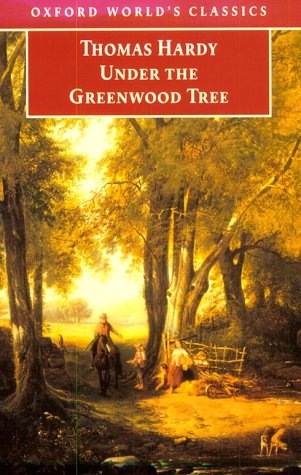
Original Publication Date: 1872
Genre: social novel
Topics: pastoral life, love, society
Review by Liz Inskip-Paulk (http://ravingreader.wordpress.com/):
Dick wondered how it was that when people were married they could be so blind to romance; and was quite certain that if he ever took to wife that dear impossible Fancy, he and she would never be so dreadfully practical and undemonstrative of the Passion as his father and mother were. The most extraordinary thing was that all the fathers and mothers he knew were just as undemonstrative as his own.This is a book of gentle humor and loving description of country life in an English small village – quite idyllic and a big comparison with his later much bleaker published works. This reminded me of E. F. Benson, Miss Read, and Angela Thirkell, except written from a Victorian mindset and using the vocabulary of the day.
It also covers a few more serious issues - gender roles, the changing times of agriculture – but it has plenty of levity and wit in its gorgeous descriptions of countryside and the people who inhabit the village. The female protagonist is a headstrong and educated village school teacher who, of course, is who a lot of the village men (and women) talk about. She’s not a shrinking violet, by any means, and the end of the book could be seen as moralistic or shocking, depending on your viewpoint.
…wives be such a provoking class o’ society, because though they be never right, they be never more than half wrong.
The book starts off with a section introducing the reader to the members of the Mellstock Quire (or Choir) and I would have been perfectly happy if the whole book had revolved around these fairly funny guys. It was still a good read when Hardy takes the narrative off into other worlds, but honestly, it would have worked just fine to stick with these early characters. (They reminded me of the old BBC comedy, “Last of the Summer Wine”…)
Divided into sections to represent the changing seasons (plus a conclusion), this was a fast read with quite a few snappy one-liners in it (not what you’d expect from an author with such a gloomy reputation) and there is plenty of satire and irony scattered throughout the story. However, despite this humor, there are loads of pastoral paradise descriptions as well – it was a beautiful reading experience and just sucked me in. I could really see some of what he was describing in my head.
…hanging of bacon, which were cloaked with long shreds of soot, floating on the draught like the tattered banners on the walls of ancient aisles…
So – there’s the twisting winding love story, the interloping of an unwanted new organist which upsets the balance of things, and a new vicar who wants to “modernize” things. There’s a funny group of old grumpy men and a country wedding, and lovely descriptions in between. I don’t think this is a particularly deep and meaningful book, but as a good read, it checks all the markers for me. I am now rather curious to read his later work to see the contrast between this rather happy story and his other more tragic takes on life.
There’s also a 2006 TV production of Under the Greenwood Tree which I’d like to track down at some point.
- Written in 1872 when Hardy was 32 – grew up in a small village in Dorset with a stonemason father and a reading mother. Mostly taught himself from the books he found in Dorchester, the nearby town, and was an apprentice to an architect when he turned 16. Specialised in restoring old houses and churches and after living in London for a few years, returned to Dorchester to be a professional restorer of church there.
- First novel he wrote was rejected and then he burned the manuscript, but then Under Greenwood got published (under an anon name at first). Also serialized (similar to Dickens et al.)
- Work reflects his idea of rural life in his fictional county of Wessex, although got bleaker as time progressed
- Also quite forward thinking with regard to role of Victorian women and the novels Tess of D’Urbervilles and Jude the Obscure were eviscerated in the press enough to stop Hardy writing novels and concentrate on poetry
- Died in 1928, and it seems (according to legend) that his heart was to be buried in Stinsford, his birthplace. All went according to plan until a cat belonging to the Hardy’s sister snatched the heart from the kitchen (where it was being temporarily kept) and disappeared into the woods with it. Yikes.